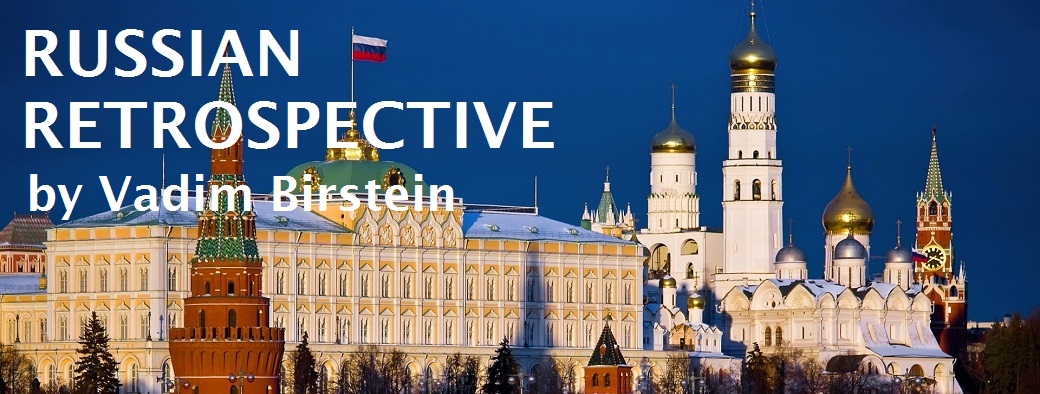On October 10, 2016, Aleksandr Khinstein, the editor of General Ivan Serov’s memoir Notes from a Suitcase, gave a short speech on the Russian TV (Channel 1) talk-show Evening with Vladimir Soloviev. He stated that Russia will successfully overcome international sanctions and the threat of “color revolutions”: “[Russian] President [Putin] has signed a law about the National Guard [of Russia]! And this is an adequate answer to the threat of sanctions!” But then Khinshtein assured the audience that the “sanctions did not hurt Russia” and “due to the sanctions our economy grew.” He also invited Donald Trump as the newly elected President of the United States: “On November 4 [sic!], Trump will win, and we will have a holiday on that day, let’s him come, we’ll meet him!”
By holiday Khinstein meant the “Day of Military Glory of Russia, Day of National Unity”, an official holiday introduced in 2005 to replace the celebration of the Soviet Bolshevik Revolution. By the way, this year’s holiday will see the unveiling of a gigantic statue of St. Vladimir, who Christianized Russia at the end of the 10th Century, in Moscow near the Kremlin. The erection of this monument was strongly criticized in Russia and internationally, as it appears Russia is locked in a competition with Ukraine for the rights to St. Vladimir.
Most likely, while extolling the National Guard (also called Rosgvardiya or Rosguards, i.e., Russian Guards), Khinstein knew about his new appointment. On October 24, Russian press announced that Khinstein was appointed adviser on ideology to Army General Viktor Zolotov, Director of the Rosguards. As the official idealogue, Khinstein will be responsible for the creation of a positive image for this new military formation of the siloviki (“men of force”).

Viktor Zolotov and Putin
This new guard service, officially created by Putin by decree in July, is officially named Federal National Guard Troops Service of the Russian Federation (Federalnaya sluzhba voiysk natsionalnoiy gvardii Rossiiyskoiy Federatsii, FSVNG RF) or Rosgvardiya, for short. This Rosguard service includes former MVD (Russian Interior Affairs Ministry) Interior Troops and former special police forces such as the OMON (Mobile Squad for Special Purposes) and SOBR (Special Fast Response Squad), as well as the FGUP “Okhrana” (Russian Federal Security Guard).
The new service will be charged with enforcing emergency-situation regimes, combating terrorism, defending Russian territory, and protecting state facilities and assets. This will be an interior army of an enormous size, the total number of soldiers is expected to be 350-400 thousand people. The service is directly subordinated to the President of Russia as Supreme Commander-in-Chief and Security Council Chairman.
Under the law, the National Guard has the authority to suppress uprisings in populated areas and to use force in the event of an armed attack on state facilities or when faced with the threat of terrorism. The National Guard is authorized to use nonlethal force to suppress mass riots, to prevent disruption of traffic, to repress crimes, or to repel attacks against guardsmen. The force is also authorized to detain individuals and enter homes at its discretion.
However, opponents of Putin’s regime consider the new service’s main purpose to be combating dissent. The official press appears to confirm the opponents fears: “Putin’s brilliant tactical decision to establish the Rosgvardiya makes impossible the seizure of power in Russia by force.” Especially troubling is the fact that the new guardsmen have the right to use weapons against women and children, Article 20. Use of Special Devices. Point 4: “It is forbidden to use special devices against women with visible signs of pregnancy, persons with obvious signs of disability and minors, except in cases of armed resistance by those persons, an attack by a group or any other attack that threatens the life or health of citizens or a serviceman (employee) of the National Guard” (my underlining).
On April 5, 2016, Putin appointed Army General Viktor Zolotov director of the new service. Zolotov also became a member of the Security Council. Putin has known Zolotov since the 1990s, when Zolotov was a personal guard of Anatoly Sobchak, then mayor of St. Petersburg, while Putin was Sobchak’s deputy. Later Zolotov and Putin were judo and boxing sparring partners. From 2000 to 2013, Zolotov commanded Putin’s personal guards (Russian President Security Service), and from 2014 to 2016, he was Commander-in-Chief of the MVD Interior Troops. On April 19, 2016 the opposition political analyst Andrei Piontkovsky, who recently escaped to Israel to avoid arrest, commented on Zolotov’s new appointment:
The appointment of Zolotov is a very strong challenge to the environment that gave birth to Putin, his alma mater — the KGB successor. It’s not a secret that after the murder of [Boris] Nemtsov [on February 27, 2015 in Moscow], the FSB conducted an obvious struggle with the same Putin during the investigation [of the murder] . . . Putin has strongly resisted this. At his insistence, the investigation was officially terminated.
Then the FSB took an unprecedented step. They simultaneously leaked through two sources . . . a denunciation of Zolotov, naming him as the organizer of the crime. And in these [published] texts there was operative information that . . . could have been obtained only from the FSB.
To me this situation is reminiscent of the last months of Stalin’s life and the struggle of [Lavrenty] Beria with the dictator’s personal bodyguard [Nikolai] Vlasik and other generals of special services.
Evidently, the new appointment of Khinstein as ideology adviser to Zolotov is part of an effort to promote the new service. Possibly, the editorial work on Serov’s memoir was a test of Khinstein’s abilities as a public relations man . . .

Pingback: New Victory of Boris Sokolov in the Court | Dr. Vadim Birstein